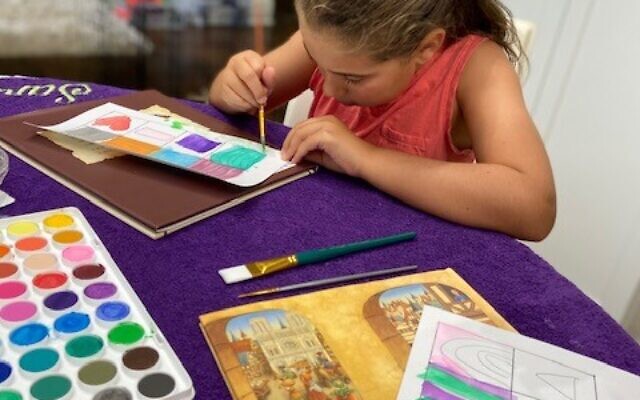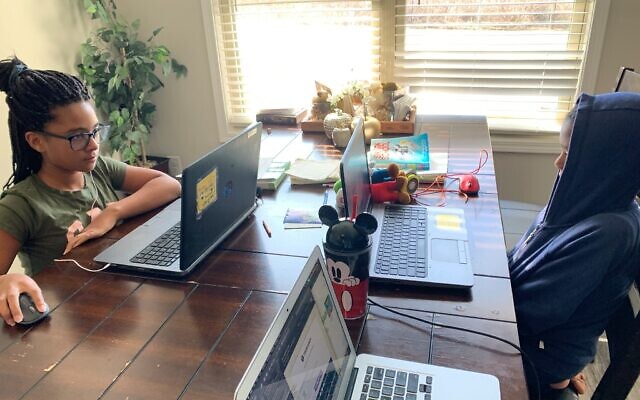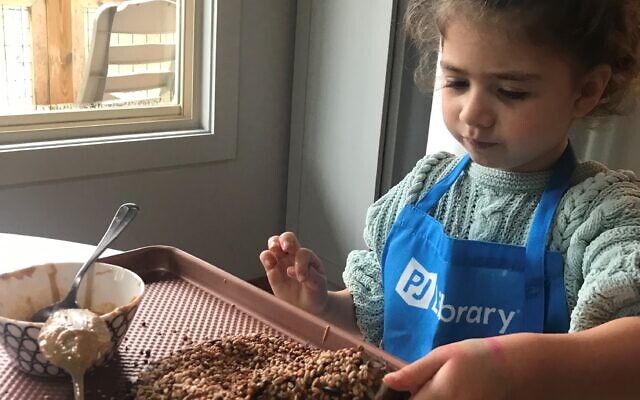Homeschooling Gains Momentum – Atlanta Jewish Times
Government leaders, school administrators, teachers and parents are trying to figure out how best to teach children during the pandemic. “Homeschooling showed myself and my kids that learning can be something you love, not just something you have to do,” said Saren Schapiro, owner of a pediatric speech-language therapy practice in Sandy Springs.
The virtual learning method, in which children sit at home in front of computer screens taught by their classroom teacher, is the more familiar option now. However, the AJT learned that a growing group of Atlanta Jewish parents are finding that homeschooling, becoming their child’s primary teacher, is the best choice to educate their children. A few of those interviewed seek advice and share information on a new Facebook group started by Schapiro called Jewish Homeschoolers of Atlanta. Since it began in April it has grown to 79 members, according to its Facebook page.
Facebook for Jewish homeschoolers
Schapiro, owner of SAGE Speech & Learning, started the group to offer networking and Jewish studies resources to parents contemplating this education option. “It’s definitely possible to figure it out and shift priorities if it’s something you want to do.” She is homeschooling her two daughters in second and third grade as well as treating clients and supervising her team of speech therapists virtually. When her children’s private school switched over to virtual learning in March due to COVID, she said, “my daughters’ spirits were breaking. They were crying, hiding under the table, refusing to participate in learning with the virtual option.”
Get The AJT Newsletter by email and never miss our top stories
Free Sign Up

Art time at the Schapiro’s home includes learning how to use watercolors and learning about lines and color mixing.
After conducting research, she decided homeschooling was “the most consistent, highest quality way to educate my children.” She adapted some online secular curriculum guides to help shape her lessons. To continue their Hebrew education, the girls use virtual tutoring, clocking three, 30-minute sessions per week.
A typical day of homeschooling includes four to five hours of structured education, such as math, reading, writing, history, geography, art and music study, as well as a constant rotation of literature read aloud with books such as “The Secret Garden” by Frances Hodgson Burnett. Spending time in nature is also part of the daily schedule, filling each day with science, journaling and free play time.
Many homeschool families have one parent who works or one who works full-time and the other, part-time.

Finding huge pinecones when visiting a fishery in Georgia’s coastal plain is one of the many science-based outdoor lessons for the Schapiros.
One size doesn’t fit all
Sarah Silverman told the AJT that her three daughters, ages 9, 13 and 15, don’t learn the same way. The North DeKalb mom started homeschooling her older children when her youngest was a newborn. Over the years, Silverman found that “each daughter, with our parental guidance, chose the kind of schooling that best suited their personalities.” Options included homeschooling, attending a neighborhood public school or virtual learning.
In a given year, there could be one child homeschooled and another using virtual learning, a hybrid of the two methods, or classes in a traditional school setting.
Before COVID, Silverman participated in the Atlanta Homeschool Cooperative. The program helps parents navigate homeschooling resources in metro Atlanta.
“This is a true co-op, where parents volunteer to fill the positions of administration, teachers and caregivers” Silverman said. With a small fee to participate, members complete a certain number of volunteer hours.
Homeschoolers learned in small groups, usually meeting at churches or community centers rented for the purpose. Rarely did they meet in participants’ homes, she said. Sometimes Co-op parent members taught when needed for certain subjects, or professional teachers were paid to lead the class. But during the pandemic, this is the first time Silverman’s children are only participating through virtual learning and homeschooling without the in-person socialization with friends in the small-group sessions.
Learning on the fly
Personal trainer Sofia Batya, living in California at the time, chose homeschooling when each of her two children reached 4 years old. “Because California required two incomes to live, I stopped homeschooling for two years and went back to it in November 2019 when my husband got stationed at Robins Air Force Base.” For curriculum ideas, she consults different educational sources, workbooks and online services such as Khan Academy.
What she likes best about homeschooling her children, now 8 and 11, is how she can be more involved in her children’s education while allowing them to work at their own pace.

The Batya children use Kahn Academy online for some subject curriculum.
The arrival of COVID didn’t have a drastic impact on their education because the children already were accustomed to learning at home, Batya said. However, the pandemic put “a dent in plans to visit certain places like museums and national parks because of closures which resulted in less opportunities for outside learning.”
It takes a village
“We don’t use a computer nor get our curriculum from a public school,” said Ana Rodríguez-Katz, who owns a yoga business, teaches Spanish and outdoor classes, and volunteers with PJ Library. She has been homeschooling her 5-year-old daughter from the time she was a preschooler, when her friends came to their home to learn Spanish. Rodríguez-Katz said she and her husband enrolled Melanie last year in a Spanish-nature immersion school in Candler Park to begin kindergarten. But when school closed in March because of the pandemic, the family moved into the home of Rodriguez-Katz’ in-laws in Blue Ridge, North Georgia.
“With my husband’s parents now living with us, we created a beautiful multi-age home where everyone contributes to Melanie’s education.” As a PJ Library Connector for the Smyrna and Vinings area, Rodriguez-Katz’ experience working with children from birth to 5 was helpful in planning lessons.

Melanie Katz makes a bird feeder out of a pinecone, bird seed and peanut butter.
“We do a child-led nature-based method at home, teaching around Melanie’s interest and mostly doing it outside in nature,” Rodriguez-Katz said. She told the AJT she schedules work and volunteerism around Melanie’s sleep and homeschooling schedule.
Strengthening the family unit is also one of the side benefits of homeschooling, according to Schapiro. “I hope all those who have spent more quality time with their kids and families this year can see the benefit of more time together,” she said.

